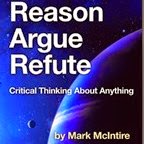Reality: We're Entitled To Nothing !
“You’re entitled to nothing. Let me repeat that. You're entitled to nothing.” --- President Frank Underwood, Season 3, Chapter 28, House of Cards on Netflix
Disagreement rages over the American ideal of ‘equal opportunity’ by way of ‘government entitlements’ or by way of individual industry. Left and Right political majorities claim it exists but for different reasons and with different outcomes. Reality decrees otherwise. Several realities bracket our access to opportunity and none of them are equal in any sense of the word. None of us can recall filling out a form before birth checking off boxes determining; who are parents would be, when and where we would be born and raised, the robustness of our DNA or lack of it, the schools we would or would not attend, the ‘diversity’ of our peers, our religious convictions or lack thereof, and the chance events that frame our perceptions of reality, truth, goodness and beauty. If you do recall filling out such a form, then get thee to a nut-house.
Leftists claim that equal opportunity is an assumed good, and it is possible to achieve through ‘government’ social engineering and universal education. Hence, “It takes a village” is their mantra. Socialism is their policy. Success through equal opportunity, they believe, can be achieved regardless of natural disparities in DNA, innate intelligence, wealth, family background and physical abilities only if a strong government legislates a ‘level playing field’ for all. Everyone is entitled to everything at government expense. That means taxing those who have and giving it to those who have not…because the ‘have-nots’ are somehow ‘entitled’. Everyone has an equal opportunity if only the government decrees and enforces it.
On the Right, the assumption is that these very government attempts to micro-mange opportunity through social engineering legislation that make equal opportunity unlikely and even impossible. America, they believe, became exceptional among nations through ‘rugged individualism’ where fierce competition and personal industry made opportunities for taking calculated risks. We are equal under the law but not equal in skills, abilities, interests, and temperaments. “Self-reliance” is their mantra and unfretted capitalism is their policy. It is immoral to take from someone who earned what they have and give it to someone who has never earned it just because they, and their politicians, feel entitled to it. Everyone has an equal opportunity if only they worked hard and took calculated risks as an individual according to their abilities. Two former presidents set this debate with unmistakable clarity.
The 1928 campaign between Alfred E. Smith, Democrat Governor of New York and Herbert Hoover, Republican President of the United States clearly illuminates this radically different view of how equal opportunity comes about. On October 22, 1928, Herbert Hoover gave the penultimate speech of his successful presidential campaign entitled, "Principles and Ideals of the United States Government." In that speech, the self-made millionaire expressed his belief that the American system was based on "rugged individualism" and "self-reliance." Government, which had necessarily assumed unprecedented economic powers during World War I, should retreat, and cease to interfere with businesses. During the early days of the Great Depression, Hoover launched the largest public works projects up until his time. But he continued to believe that problems of poverty and unemployment were best left to "voluntary organization and community service." He feared that federal relief programs would undermine individual character by making recipients dependent on the government. He continued to prioritize the concept of "rugged individualism" even in the face of monumental economic catastrophe. “We are challenged with a peace-time choice between the American system of rugged individualism and a European philosophy of paternalism and state socialism,”, he concluded.
While it’s true that the failed presidential campaign of Alfred E. Smith turned the Democrat Party to champion the poorest of the poor promising them ‘a level playing field’ Smith did pave the way for FDR’s 'New Deal' That, progressively, paved the way for the massive government entitlements we know today through LBJ, Carter, and Obama. (JFK would be considered a Republican today.)
FDR's convention acceptance speech in 1936 makes this clear:
“Today we stand committed to the proposition that freedom is no half-and-half affair. If the average citizen is guaranteed equal opportunity in the polling place, he must have equal opportunity in the marketplace. ...These economic royalists complain that we seek to overthrow the institutions of America. Against economic tyranny such as this, the American citizen could appeal only to the organized power of government.”
And so it began, the long inexorable march of the organized power of government, power to impose, power to decree, power to regulate the impossibility of equal opportunity. Kurt Vonnegut projected the logical outcome of this relentless pursuit of a social myth in his satirical short story, Harrison Bergeron (thanks to my friend and colleague Matthew Bixby for the reference).
Here's the plot. By the year 2081, Amendments 211, 212, and 213 to the United States Constitution, decreed that all Americans are fully equal. By law, no one is stupider, uglier, weaker, slower, richer or poorer than anyone else. The ‘Handicapper General’ and a team of agents ensures that the laws of equality are enforced universally.
One day, fourteen-year-old Harrison Bergeron is taken away from his parents, George and Hazel, by government agents from the Handicapper General, Diana Moon Glampers. George and Hazel are vaguely docile and compliant. Hazel’s lack of fuzziness is due to her innate average intelligence. George can’t process the reality of his son’s arrest because equality laws require him to wear a noise pulsing radio twenty-four hours a day. At random moments, government agents pulse noise over these radios to disrupt the thought processes of all intelligent people. George is an innately intelligent person.
As the story progresses, government agents burden Harrison, George and a variety of dancers and musicians with physical and mental restrictions to make them equal to those without their good looks, talents and abilities. With a quaint Orwellian conclusion the handsome and talented son, Harrison, is shotgunned by Diana Moon Glampers, the Handicapper General while his parents are rendered incompetent to even understand what had happened let alone do anything about it. Everyone is equal through the overwhelming power of government.
What stands in the way of this satire becoming reality? Individual freedom to choose according to individual skills, abilities, interests, and temperaments will eventually prevent the power of government to tinker with opportunity through artificial entitlements. This is the truth of it isn’t it? We can live in our endowed past and we can resent it. We can dwell on the things we never had and envy those we think have them now. We can complain we deserved better. We can live in a future we can’t predict but only dream about. We can insist we deserve a better opportunity. Or, we can live now since we can’t ever change our past. We can’t see what’s just around the corner that can change everything. Our choices specify our opportunities. This has nothing to do with entitlements. FU is right. We're entitled to nothing.












Comments
Post a Comment
Dear reader,
I hope you will leave a comment regardless of content...I learn something from all comments regardless of agreement or disagreement.
Thank you for your kindness.
--- Mark McIntire